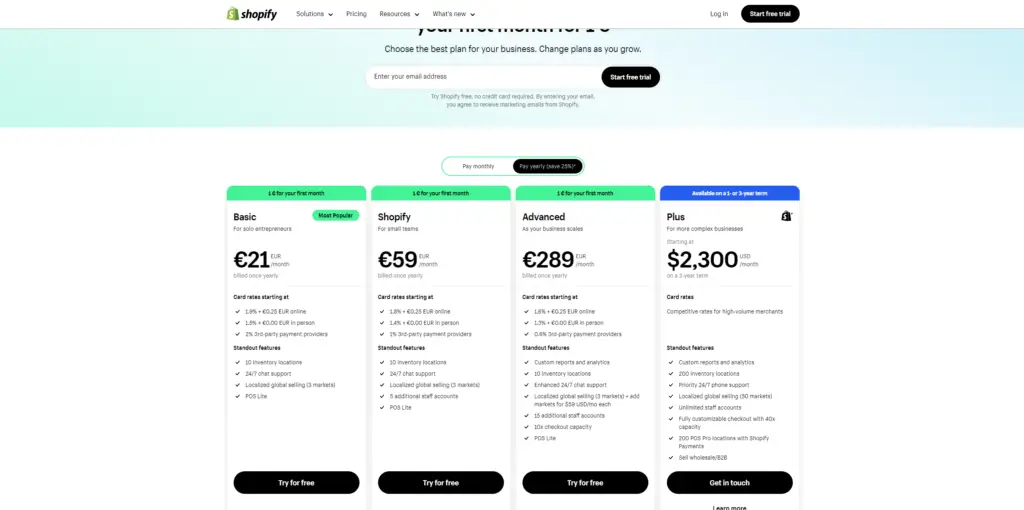In today’s digital age, the e-commerce landscape is more competitive than ever. With countless options available, choosing the right platform for your online store is crucial to your business’s success. The right e-commerce software can streamline operations, enhance customer experiences, and drive sales, while the wrong choice can lead to inefficiencies, lost revenue, and frustration. As a result, it’s vital to carefully evaluate and select a platform that aligns with your business needs and growth plans, for this reason, we have decided to write this Shopify Software Review.
1. What is Shopify?
Shopify is a comprehensive e-commerce platform that allows individuals and businesses to create, manage, and grow their online stores. It provides a suite of tools and services designed to help users build a professional online presence, manage their inventory, process payments, and handle shipping logistics all from a single, user-friendly interface.
Brief History and Founding of Shopify
Shopify was founded in 2006 by Tobias Lütke, Daniel Weinand, and Scott Lake. The idea for Shopify was born out of Lütke’s frustration with the existing e-commerce solutions available at the time while trying to set up an online store for snowboarding equipment. Determined to create a better solution, Lütke, a skilled programmer, decided to build his own platform. The result was Shopify, a tool that made it easy for anyone to set up and manage an online store without needing extensive technical knowledge.
Overview of Shopify’s Growth and Current Market Position
Since its inception, Shopify has experienced rapid growth and expansion. The platform’s user-friendly design, extensive app ecosystem, and reliable customer support have attracted a diverse range of users, from small startups to large enterprises. Today, Shopify powers over one million businesses globally, ranging from small, independent shops to major brands like Gymshark, Heinz, and Tesla.
The company went public in 2015 and has continued to innovate and expand its offerings, solidifying its position as a leader in the e-commerce industry. With a strong commitment to continuous improvement and customer success, Shopify remains at the forefront of the e-commerce revolution, helping businesses of all sizes achieve their online goals.
2. Shopify Software Review: Key Features

Shopify is renowned for its intuitive and user-friendly interface, making it accessible to users with varying levels of technical expertise. The platform offers a clean, organized dashboard where users can easily manage their store’s operations, from product listings and inventory to customer orders and marketing campaigns.
Setup Process and Dashboard Navigation: Setting up a Shopify store is straightforward and quick. The step-by-step setup wizard guides users through the process, including selecting a theme, adding products, setting up payment gateways, and configuring shipping options. The dashboard is designed for easy navigation, allowing users to find and manage different aspects of their store with minimal effort.
Customization and Themes
Variety of Themes Available: Shopify offers a wide range of professionally designed themes, catering to various industries and styles. Users can choose from free and premium themes to find the perfect look for their online store. These themes are mobile-responsive, ensuring that the store looks great on all devices.
Shopify Software Review: Customization Options: Each theme is highly customizable, allowing users to tweak colors, fonts, and layouts to match their brand identity. Shopify’s drag-and-drop editor makes it easy to modify the design without needing coding skills. For those with technical expertise, Shopify’s Liquid template language allows for deeper customization and control over the store’s appearance.
App Store
Overview of the Shopify App Store: The Shopify App Store is a robust marketplace offering thousands of apps and integrations to enhance the functionality of your online store. These apps cover various needs, including marketing, sales, customer service, inventory management, and shipping.
Popular Apps and Integrations: Some popular apps include Oberlo for dropshipping, Klaviyo for email marketing, Yotpo for customer reviews, and ShipStation for shipping management. These integrations help streamline business operations and provide additional tools to improve the customer experience and boost sales.
Payment Processing
Supported Payment Gateways: Shopify supports a wide range of payment gateways, including PayPal, Stripe, and Authorize.net, giving merchants flexibility in how they accept payments. This ensures that customers can pay using their preferred methods, whether credit cards, digital wallets, or alternative payment options.
Shopify Software Review: Payments and Transaction Fees: Shopify Payments, the platform’s built-in payment processor, simplifies the payment setup process and eliminates the need for third-party integrations. Using Shopify Payments, merchants can avoid additional transaction fees imposed by third-party payment gateways, although standard credit card processing fees still apply.
Security
SSL Certificates and PCI Compliance: Shopify includes SSL certificates for all its stores, ensuring that data transmitted between the store and customers is encrypted and secure. Additionally, Shopify is PCI DSS compliant, meeting the highest standards for payment security in the industry.
Shopify Software Review: Data Protection Features: Shopify takes data security seriously, implementing multiple layers of protection, including regular security updates, secure data storage, and robust backup systems. This helps protect sensitive customer information and minimizes the risk of data breaches.
Customer Support
Types of Support Available (24/7 Chat, Email, Phone): Shopify offers comprehensive customer support, available 24/7 via live chat, email, and phone. This ensures that users can get assistance whenever they need it, regardless of their time zone.
Quality and Responsiveness: Shopify’s customer support team is known for being knowledgeable and responsive. They provide quick, helpful solutions to a wide range of issues, from technical problems to general inquiries about using the platform. Additionally, Shopify offers extensive documentation, including guides, tutorials, and a community forum, to help users find answers and learn how to maximize the platform’s potential.
Interested in e-commerce SaaS platforms? Take a look at this article about the Top e-commerce SaaS platform that can boost your online business!
3. Shopify Software Review: Pros and Cons
Pros
Ease of Use for Beginners: Shopify is designed with simplicity in mind, making it an excellent choice for beginners. The platform’s intuitive interface, easy-to-follow setup process, and comprehensive guides ensure that even those without technical skills can quickly build and launch their online stores. The drag-and-drop builder and pre-designed themes simplify the customization process, allowing users to create a professional-looking website with minimal effort.
Extensive App Ecosystem: One of Shopify’s standout features is its extensive app ecosystem. The Shopify App Store offers thousands of apps and integrations that enhance the platform’s functionality. Whether you need tools for marketing, SEO, customer service, or inventory management, there’s likely an app that meets your needs. This flexibility allows businesses to customize their store’s capabilities to suit their specific requirements and grow their operations efficiently.
Reliable Customer Support: Shopify is known for its reliable customer support, available 24/7 via live chat, email, and phone. The support team is responsive and knowledgeable, providing quick assistance and solutions to a wide range of issues. Additionally, Shopify offers a wealth of resources, including detailed documentation, tutorials, and a community forum, which help users find answers and learn how to make the most of the platform.
Cons
Transaction Fees Without Shopify Payments: While Shopify offers numerous payment gateways, using a third-party gateway can incur additional transaction fees. These fees can add up, particularly for high-volume stores. However, merchants can avoid these fees by using Shopify Payments, the platform’s built-in payment processor, though it may not be available in all regions.
Limited Customization for Advanced Users: While Shopify provides a high level of customization for most users, advanced users might find the platform somewhat restrictive. Customizing the checkout process and other core functionalities often requires the use of Shopify’s Liquid coding language, which can be limiting compared to more open-source platforms. This might pose challenges for developers looking to implement highly specific or complex customizations.
Cost of Additional Apps and Themes: Although Shopify’s app ecosystem is a significant advantage, it can also become costly. Many of the apps and premium themes come with additional subscription fees, which can increase the overall cost of running your store. Businesses need to carefully evaluate the necessity and value of each app to avoid unnecessary expenses.
4. Shopify Software Review: Pricing Plans

Shopify’s pay-as-you-go solutions can vary depending on the plan you choose, in detail the plans available are:
Basic Shopify: The Basic Shopify plan is ideal for new e-commerce businesses and startups. Priced at $39 per month, this plan includes essential features such as unlimited product listings, 24/7 customer support, and access to the Shopify App Store. It also offers basic reports and two staff accounts.
Shopify: The Shopify plan, priced at $105 per month, is designed for growing businesses. It includes all the features of the Basic plan plus more advanced reporting, five staff accounts, and professional reports. Additionally, it offers better shipping discount rates and reduced credit card fees, making it a cost-effective choice for expanding operations.
Advanced Shopify: The Advanced Shopify plan is geared towards larger businesses and enterprises. At $399 per month, it provides advanced report building, up to 15 staff accounts, and the lowest transaction fees. This plan also includes third-party calculated shipping rates, which is beneficial for businesses with complex shipping needs.
Additional Costs
Apps and Themes: While Shopify offers a range of free themes and apps, many premium options come with additional costs. Premium themes can range from $100 to $350, and app subscriptions vary widely, from a few dollars per month to several hundred, depending on the app’s functionality and features.
Transaction and Payment Processing Fees: In addition to the monthly subscription fees, merchants must consider transaction and payment processing fees. Using Shopify Payments can help avoid additional transaction fees, but standard credit card processing fees (2.9% + 30¢ per transaction for Basic Shopify, for instance) still apply. Third-party payment gateways incur additional fees, which can impact profit margins.
Shopify Software Review: Comparison with Competitors
Pricing concerning Other E-Commerce Platforms: When compared to competitors like WooCommerce, BigCommerce, and Magento (Now Adobe Commerce), Shopify’s pricing is competitive, especially considering the ease of use and comprehensive feature set it offers. WooCommerce, for example, is open-source and free to use, but additional costs for hosting, security, and extensions can add up.
BigCommerce offers similar pricing tiers but includes more features in its standard plans, which might be more cost-effective for some businesses. Magento, being highly customizable, can become expensive due to development and hosting costs.
5. Shopify Software Review: Key Points Summary
In this Shopify software review, we explored various aspects of the platform that make it a leading choice for e-commerce businesses. We discussed its key features, including ease of use, extensive customization options, a robust app ecosystem, secure payment processing, strong security measures, and reliable customer support.
Additionally, we highlighted the pros and cons, noting Shopify’s user-friendliness and extensive app store as significant advantages, while also considering the potential drawbacks such as transaction fees without Shopify Payments and the cost of additional apps and themes. We also examined Shopify’s pricing plans, offering detailed insights into the Basic, Shopify, and Advanced plans, along with their respective features and costs.
Final Verdict
Shopify is a powerful and versatile e-commerce platform suitable for a wide range of businesses, from small startups to large enterprises. Its ease of use makes it ideal for beginners who need a straightforward way to set up and manage their online stores, while its extensive app ecosystem and customization options cater to the needs of growing and established businesses.
The platform’s comprehensive customer support and robust security features further enhance its appeal. However, businesses should be mindful of potential additional costs associated with apps and premium themes and consider the impact of transaction fees if not using Shopify Payments. Overall, Shopify is an excellent choice for those looking to build a scalable, feature-rich online store with minimal hassle.
